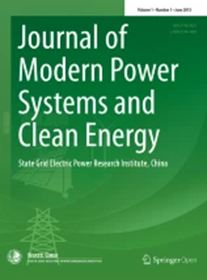利用物联网测量进行基于概率论的电网事件自由检测
IF 5.7
1区 工程技术
Q1 ENGINEERING, ELECTRICAL & ELECTRONIC
Journal of Modern Power Systems and Clean Energy
Pub Date : 2023-11-22
DOI:10.35833/MPCE.2023.000205
引用次数: 0
摘要
本文利用物联网(IoT)测量的优势,将事件检测问题表述为信息加噪声模型,并基于自由概率理论(FPT)检测电力系统中的事件。利用从相量测量单元(PMU)收集的大数据,我们构建了事件检测矩阵,以反映电力系统状态的空间和时间特征。事件检测矩阵被进一步描述为信息矩阵加噪声矩阵,而事件检测的本质就是从事件检测矩阵中提取事件信息。通过将事件检测问题与 FPT 联系起来,计算信息矩阵样本协方差矩阵的相关矩的经验谱分布 (ESD),从而将事件与 "噪声"(包括正常波动、背景噪声和测量误差)区分开来。根据中心极限理论(CLT),利用在正常状态下收集的测量值计算报警阈值。此外,本文还借助滑动窗口建立了一个事件检测架构,以反映电网状态并在线检测事件。利用中国安徽的模拟数据和中国广东的真实 PMU 数据进行的案例研究验证了所提方法的有效性。与其他数据驱动方法相比,所提出的方法更加灵敏,对真实 PMU 案例中的正常波动、背景噪声和测量误差有更好的适应性。此外,它不需要训练-测试范式所需的大量训练样本。本文章由计算机程序翻译,如有差异,请以英文原文为准。
Free Probability Theory Based Event Detection for Power Grids Using IoT-Enabled Measurements
Taking the advantage of Internet of Things (IoT) enabled measurements, this paper formulates the event detection problem as an information-plus-noise model, and detects events in power systems based on free probability theory (FPT). Using big data collected from phasor measurement units (PMUs), we construct the event detection matrix to reflect both spatial and temporal characteristics of power gird states. The event detection matrix is further described as an information matrix plus a noise matrix, and the essence of event detection is to extract event information from the event detection matrix. By associating the event detection problem with FPT, the empirical spectral distributions (ESDs) related moments of the sample covariance matrix of the information matrix is computed, to distinguish events from “noises”, including normal fluctuations, background noises, and measurement errors. Based on central limit theory (CLT), the alarm threshold is computed using measurements collected in normal states. Additionally, with the aid of sliding window, this paper builds an event detection architecture to reflect power grid state and detect events online. Case studies with simulated data from Anhui, China, and real PMU data from Guangdong, China, verify the effectiveness of the proposed method. Compared with other data-driven methods, the proposed method is more sensitive and has better adaptability to the normal fluctuations, background noises, and measurement errors in real PMU cases. In addition, it does not require large number of training samples as needed in the training-testing paradigm.
求助全文
通过发布文献求助,成功后即可免费获取论文全文。
去求助
来源期刊

Journal of Modern Power Systems and Clean Energy
ENGINEERING, ELECTRICAL & ELECTRONIC-
CiteScore
12.30
自引率
14.30%
发文量
97
审稿时长
13 weeks
期刊介绍:
Journal of Modern Power Systems and Clean Energy (MPCE), commencing from June, 2013, is a newly established, peer-reviewed and quarterly published journal in English. It is the first international power engineering journal originated in mainland China. MPCE publishes original papers, short letters and review articles in the field of modern power systems with focus on smart grid technology and renewable energy integration, etc.
 求助内容:
求助内容: 应助结果提醒方式:
应助结果提醒方式:


